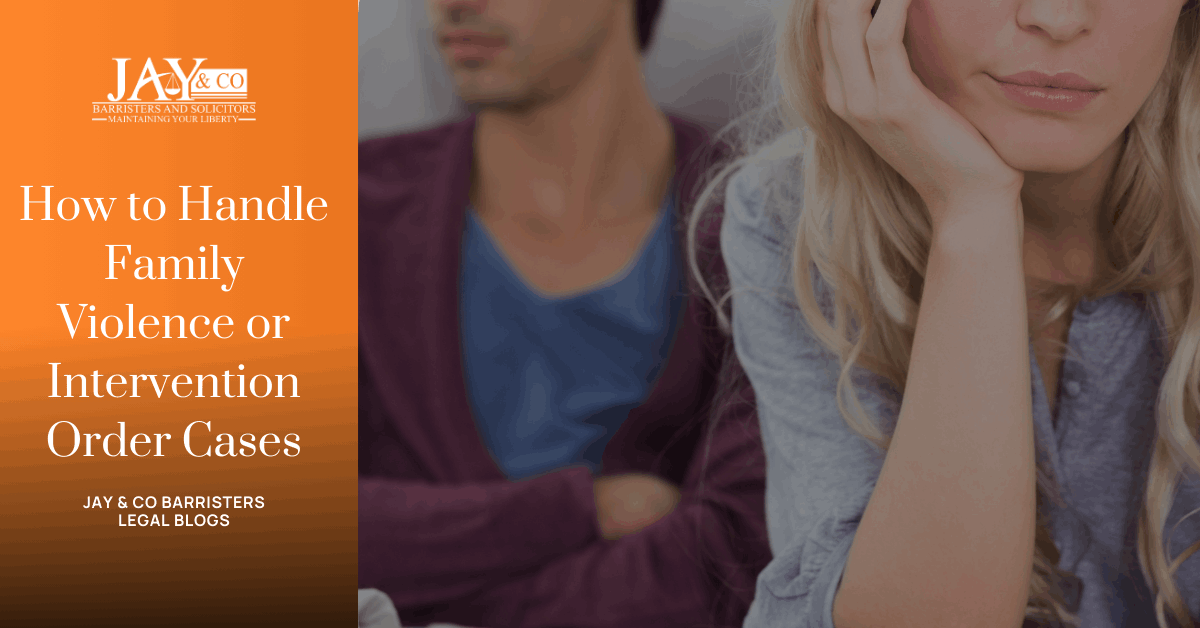INTERVENTION ORDERS – TWO TYPES
The use of Intervention Orders in today’s day and age are becoming more and more prevalent in our judicial system. In Victoria, Our legislature has legislated for two main types of Intervention Orders to cover for two main purposes. The first one falls under the ambit of the Personal Safety Intervention Order Act 2010, whilst the second one lies under the Family Violence Protection Act 2008.
The Following information is a breakdown on the jurisdiction and powers of these orders; and how they are applied in Victoria. Jay & Co hopes that you will have a sound, or at least somewhat of an understanding of how Intervention Orders are used; and if and how they are to be contested at all.
Personal Safety Intervention Order Act (2010).
S.12 of the Act dictates that a person who applies for a personal safety intervention order must do so at a proper venue of the Magistrates or Children’s court, ie. whichever one is relevant to the Applicant. An Application can only be made to either stop or prevent prohibited behaviour being carried out by the Respondent towards the Applicant.
S.5 of the Act defines prohibited behaviour as an assault, sexual assault, harassment, property damage or interference or making a serious threat.
S.11 of the Act states that this Act does not apply to the enforcement of criminal law, administration of any Act, the enforcing of a law imposing a
pecuniary penalty, the execution of a warrant or the protection of the public revenue.
In the hearing of an intervention order matter, the court is very likely and more often than not will impose an interim order. What an interim order is, is an order that has the required conditions of a full order, in order to provide protection to the Applicant until the final hearing date that is issued by the court. Interim Order will be granted under the conditions governed by:-
S. 35:- Court must be satisfied that on a balance of probabilities an interim order is necessary pending the final decision of the application, to ensure the safety of the applicant, to preserve any property of the applicant; and that it is appropriate to make the order in all the circumstances of the case before the court.
S.35(4):- In deciding whether to issue an interim order, a court may consider the respondent’s age and maturity, understand the nature and effect of the interim order, whether the respondent has an impairment of any sort, as to whether the respondent will comply with the conditions of the order and conclusively comprehends what the effect and nature of the interim order is. Interim Order can be granted as long as some of the alleged conduct occurred within Victoria, as long as the applicant was within Victoria when the alleged conduct occurred.
Also, it is important to note that under the act, if an Application is made against you and you fail to attend court; an interim as well as a full order may be granted against the respondent if service has been affected properly.
S.37:- An interim order may be made in the absence of the respondent. Whether or not the order has been served with a copy of the Application for a Personal Safety Intervention Order; and whether or not the respondent is present when the interim order is made.
Family Violence Protection Act (2008)
There is a massive disposition towards Family Violence in Victoria. This Act seeks to maximise safety towards children; as well as to prevent and reduce family violence to the greatest extent possible, along with promoting the accountability of family violence perpetrators.
S.5:- Defines Family Violence as behaviour that is physically or sexually abusive, emotionally or psychologically abusive, economically abusive,
threatening or coercive, or in any other way controls or dominates the family member and causes that family member to feel fear or safety for the wellbeing of that family member or another person. Also is classified as behaviour by a person that causes a child to hear, witness or otherwise be exposed to to the effects of the behaviour listed above.
S.5(2):- Also includes intentionally damaging the property, or threatening to do so of a family member’s; as well as unlawfully depriving the family
member of their liberty, or threatening to do so. As well as causing, or threatening to cause the death or injury of an animal, whether or not the animal belong to that family member or not.
It is imperative to keep in mind that within Family Violence Applications, the definition of behaviour may constitute to be family violence even if the behaviour is not classified as a criminal act.
Applications for Family Violence Orders, can and very often are initiated by Police Officers. Their powers come under the following sections.
S.13:- The police officer believes on reasonable grounds that the exercise of the power is necessary to ensure the safety of a family member of the person or to preserve any property of the applicant, or affected family member.
S.14 and S.15:- Outline the powers of the police to direct and detain a respondent under a family violence intervention order application. The protocol to detain a respondent under the application is only if the police member considers it necessary to do so for the protection of any person, or property or to prevent the person from escaping from detention.
S.50(1)(a):- A Magistrate or a registrar of the court may issue a warrant for the arrest of an adult respondent, to ensure the safety of the affected family member, to preserve any property of the affected family member, or to protect a child who has been subjected to family violence committed by the respondent, or to ensure the respondent attends court at a mention date for the application.
S.92:- On the basis that an Order is Applied, this section permits for provisions to be included in the order that will relate to the access of any child involved in the relationship between the parties; which allows for the arrangements to be made in writing.
The other particulars to a Family Violence Order Application are very similar to a Personal Safety Order. However if there is a Family Violence Order applied, this will work against the Respondent in any Family Law Proceedings that may arise in a Family Court. Therefore, it is imperative to have a S.92 provision included on the Order, as well as there to be no admissions made to any allegations if an order is to be issued.
Ultimately, the proceedings for both kinds of Intervention Orders will be based on an evidence and legal basis. So, it will come down to contested legal proceedings in a court of law; that ultimately will have the applicant seek to prove the issuing of the order on a balance of probabilities. Applications for both types of Intervention Orders can be made by your legal representative, on in person at your local Magistrates’ Court; and whether or not they will be awarded will again be on evidentiary grounds.
It is always imperative to take note that Intervention Orders impinge on the liberty and the freedom of movement, or association of anyone they are applied to. The conditions of an intervention order are also equally as important; as the requirement of challenging any allegations put in the application of an intervention order.
These matters often require the disclosure of very personal and emotional situations, which delve into the circumstances of a respondent and/or applicant. In dealing with Intervention Orders, a competent, experienced and an empathetic lawyer is definitely required.



